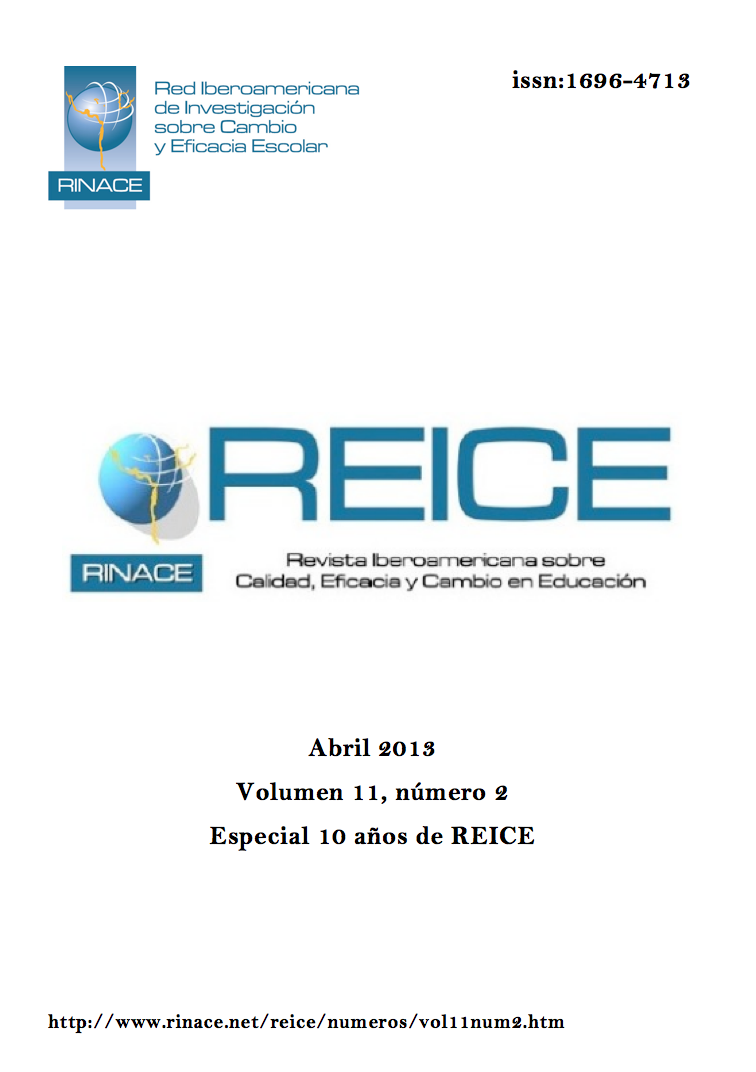Inclusive Research in Difficult Times. Provisional Certainties and Pending Debates
Keywords:
Quality, Effectiveness, Change, Improvement, Equity, InnovationCopyright (c) 2016 REICE. Revista Iberoamericana sobre Calidad, Eficacia y Cambio en Educación

This work is licensed under a Creative Commons Attribution-NonCommercial-NoDerivatives 4.0 International License.
Abstract
This paper proposes several epistemological reflections on inclusive research derived from the experience of the authors in some research projects carried out over the last few years. The debates proposed in the paper try to bring out some difficulties that should be solved in the process of building some knowledge intended to be inclusive. In particular, it presents two main arguments. First, it analyses the debates related to the possible different meanings of inclusion and exclusion as object of study and then it presents some methodological dilemmas that should be faced in inclusive research. This is organized under the premise that our choices during the research process are not indifferent or value-free, but are inevitably committed to the construction of particular discourses about the research subjects.
Downloads
References
Arnaiz, P. (2003). Educación inclusiva: una escuela para todos. Archidona: Aljibe
Barton, L. (2005). Emancipatory research and disabled people: some observations and questions. Educational Review, 57(3), 317-327
Barton, L. y Oliver, M. (1997). Disability Studies: Past, Present and Future. Leeds: Disability Press.
Bertaux, D. (2005). Los relatos de vida. Perspectiva etnosociológica. Barcelona: Bellaterra.
Clandinin, F.M. y Conelly, D.J. (1995). Relatos de experiencia e investigación narrativa. En Larrosa et al. Déjame que te cuente: ensayos sobre narrativa y educación (pp. 11-59). Barcelona. Alertes.
Connell, R.W. (2005) Growing up masculine: rethinking the significance of adolescence in the making of masculinities. Irish Journal of Sociology, 14(2), 11-28.
Davies, B. (2003). Shards of glass: Children reading and writing beyond gendered identities. Cresskill: Hampton Press.
Echeita, G. (2006). Educación para la inclusión o educación sin exclusiones. Madrid: Narcea.
Escudero, J. M. (2005). Fracaso escolar, exclusión social: ¿De qué se excluye y cómo? Profesorado. Revista de currículo y formación del profesorado, 9, 1-25.
Fine, M. et al. (2000). For whom? Qualitative research, representations and social responsibilities. En N. K. Denzin e Y. S. Lincoln (Eds), Handbook of qualitative research (pp. 250-292). Londres: Sage.
Fraser, N. y Honneth, A. (2006). ¿Redistribución o reconocimiento? Madrid: Morata.
Francis, B. (1999). Modernist reductionism or post-structural relativism: can we move on? An evaluation of the arguments in relation to feminist educational research. Gender and education, 11(4), 381-393.
Gabel, S. y Peters, S. (2004). Presage of a new paradigm: Beyond the social model of disability toward resistance theories of disability. Disability and Society, 19,571-596.
Gillman, M., Swain, J. y Heiman, B. (2006). Life History or Case History: the objectification of people with learning difficulties through the tyranny of professional discourses. Disability and Society, 12 (5), 675-694.
James, R. (2011) The reflective ethnographer and analysis of subjectivities using the “voice cenred relatinal model”. Trabajo presentado en el Oxford Ethnography and education conference, University of Oxford.
Mauthner, N.y Doucet, A. (2003). Reflexive accounts and accounts of reflexivity in qualitative data analysis.Sociology, 37(3), 413-431.
Morin, E. (2003). Réforme de pensée, transdisciplinarité, réforme de l'Université. Centre International de Recherches et Études Transdisciplinaires. Disponible online en: http://perso.club-internet.fr/nicol/ciret/bulletin/b12/b12c1.htm .
Moriña Díez, A. (2010) School Memories by Young People With Disbilities: an Analysis of Barriers and Aids to Inclusion. Disability and Society. 25(2), 163-175.
Nussbaum, M. (2012). Crear capacidades: propuesta para el desarrollo humano. Bercelona: Paidós Ibérica.
Oliver, M. (1992). Changing the social relations of research productions? Disability, Handicap and Society, 7(2), 101-114.
Parrilla, A. (2007). Inclusive Education in Spain: a view from inside. En L. Barton and F. Amstrong (Eds.), Policy, Experience and Change: Cross Cultural Reflections on Inclusive Education (pp.19-36). Dordrecht: Springer.
Parrilla, A. (2009). ¿Y si la investigación sobre inclusión no fuera inclusiva? Reflexiones desde una investigación biográfico-narrativa. Revista de Educación, 349, 101-117.
Parrilla, Angeles (2010) Ética para una investigación inclusiva. Revista de Educación Inclusiva, 3 (1), 165-174.
Parrilla, A. Gallego, C. y Moriña, A. (2010) El complicado tránsito a la vida activa de jóvenes en riesgo de exclusión. Una perspectiva biográfica. Revista de Educación, 351, 211-233.
Plummer, K. (2005). Documents of life. An invitation to a critical humanism. Londres: Sage.
Richardson, L. y Adams, E. (2005). Writing. A method for inquiry. En N. Denzin, y Y. Liconln. The Sage Handbook of Qualitative Reseach (959-978). California: Sage Pub.
Rojas. S.; Susinos, T y Calvo, A. (2012) "Giving voice" in research processes: an inclusive methodology for researching into social exclusion in Spain. International Journal of Inclusive Education, 1, 1-18.
Sen, A.K. (2000). Desarrollo y libertad. Madrid: Planeta.
Sen, A.K. (2010). La idea de la justicia. Madrid: Taurus.
Slee, R. (1997). Supporting an international interdisciplinary research conversation. International Journal of Inclusive Education, 1(1), 1-4.
Subirats, J., Carmona, R. y Brugué, J. (2005). Riesgos de exclusión social en las comunidades autónomas. Institut de Govern i polítiques públiques. UAB.
Susinos, T. (2007) Tell me in your own words: disabling barriers and social exclusions in young persons. Disability and society, 22(2), 1-25.
Susinos, T. (2009) Escuchar para compartir. Reconociendo la autoridad del alumnado en el proyecto de una escuela inclusiva. Revista de Educación, 349, 119-136.
Susinos, T. y Parrilla, A. (2008) Dar la voz en la investigación inclusiva. Debates sobre inclusión y exclusión desde un enfoque biográfico-narrativo. REICE. Revista Iberoamericana sobre Calidad Eficacia y Cambio en Educación, 6(2) 157-171.
Susinos, T. y Rodríguez-Hoyos, C. (2010) La educación inclusiva hoy. Reconocer al otro y crear comunidad a través del diálogo y la participación. Revista Interuniversitaria de Formación del profesorado, 70(25), 15-30
Susinos, T. y Ceballos, N. (2012) Voz del alumnado y presencia participativa en la vida escolar. Apuntes para una cartografía de la voz del alumnado en la mejora educativa. Revista de Educación, 359(4), 44-79.
Tezanos, J. F. (Ed.) (2001). Tendencias en desigualdad y exclusión social. Madrid: Sistema.
Young, I. M. (2000). La justicia y la política de la diferencia. Madrid: Cátedra/ Feminismos.
